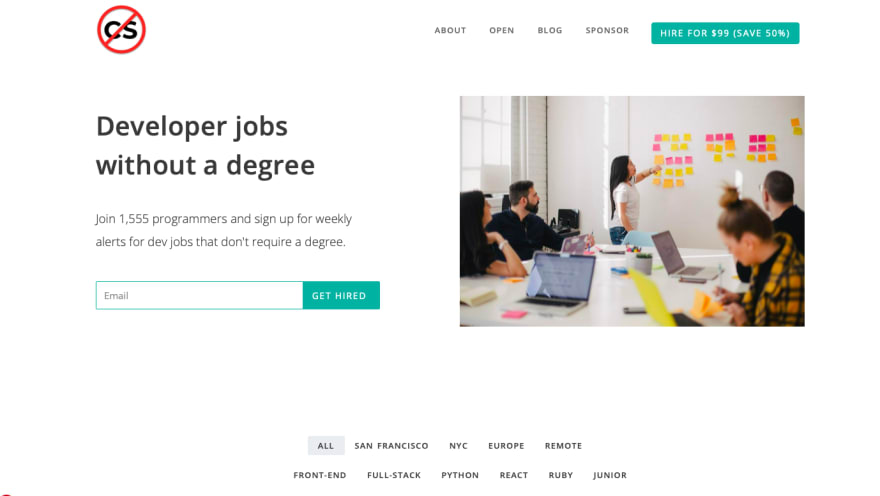Today's interview is with Lucie Vrsovska, a developer working in Prague. Lucie taught herself to code before doing a bootcamp where she was talent spotted by a speech recognition sofware company. Here she gives an in-depth view of how she learned web development and got hired for the first time despite not having a degree in Computer Science.
Hey, so can you give us a short introduction for people who want to know more about you?
Hi all! My name is Lucie and I’m currently based in Prague, Czech Republic, where I work as a Frontend Developer at Newton Technologies – a small company that specialises in speech recognition software. 👩💻
My journey to tech hasn’t been very straightforward. I first went to law school at the age of 19 but soon got fed up with their outdated educational practices and unfair treatment of students, and quit the programme halfway through. I then went on to study management and finance, and got a Master’s degree from a university in the UK where I later started working as a research administrator. It didn’t take me very long, however, to learn what was needed to perform the job and I got bored pretty quickly...
That overwhelming feeling that I was working way below my potential was haunting me day and night. The kind of job I was craving was one that is more challenging and intellectually stimulating, and that often takes me into my hyper-focus state (a state of mind that brings me joy and a sense of purpose). I didn’t know what exactly that could be but I was determined to figure that out!
If you don’t have a CS degree, how did you learn coding? Did you do any particular courses or bootcamps?
My coding journey was partly a self-study and partly a bootcamp experience. Following my return from the UK, I signed up for a few online courses in search of my dream career. Firstly, I completed a course on Data Science from Coursera where I learnt the basics of programming, Python, and SQL (I had some experience with data analysis through a couple of internships and wanted to give this path a go). Later I continued with courses geared more towards software development, and a whole new world has opened up to me! My newly discovered passion was bringing me so much joy I decided to do whatever it takes to make this my full-time profession.
I spent over 3 months doing intensive self-study before enrolling into Coding Bootcamp Praha. I taught myself the foundations of web design and full-stack development (HTML, CSS, JavaScript, React, Node.js, MongoDB, MySQL, GraphQL, Git etc.) from a variety of sources (Codecademy, freeCodeCamp, Udemy, Frontend Masters, Scrimba). The bootcamp programme that followed took 12 weeks full time. In addition to what I already knew, I learnt the basics of PHP and Laravel, gained experience with pair-programming, working on group projects, doing daily standups and fortnightly coding hackathons. Plus, we attended a few HR workshops with recruitment experts where we received tips and tricks regarding job hunting and making our LinkedIn profiles stand out.
Were there any habits you adopted which made it easier to learn to code?
Yes – I need to admit that part of my success was thanks to my killer coding routine. During those 6 intensive months, I would spend anything between 8 and 16 hours a day studying (with some days off, of course). I started coding at the age of 28 and had absolutely zero experience (no, I didn’t even code a MySpace page or a simple online game as a teenager) – I literally wrote my first “Hello, World!” and a for loop just over a year ago in January 2019 (it’s been my first anniversary a few weeks back, yaay!). With that in mind, I felt like I needed to learn a lot in a short period of time in order to catch up.
Anyway, this could be an effective strategy for you too to faststart your new programming career though I need to stress that this killer routine can only be sustained for a limited period of time. Otherwise you're risking a burnout and exhaustion which would likely deem you unproductive for a potentially long time. Above all, you need to look after yourself – no job or career is ever worth more than your physical and mental health!
Lastly, I don’t think you need to be somewhat exceptionally talented or some sort of a math geek to learn coding (talent is so overrated!). What you do need, in my opinion, is passion, patience, perseverance, and resilience – if you have these then I’m sure you’re gonna make it! 😉
How did you get your first programming job in Prague?
Quite simply, I got talent spotted at my coding bootcamp (or can I say “potential spotted”? I just told you talent wasn’t needed…). I was approached by one instructor and one mentor about possible job opportunities at the companies they work for (when they don’t teach).
So we arranged an interview at each company for the week following my bootcamp graduation. The second one didn’t even require a technical exam because, quite frankly, the instructor had been observing and testing me for long enough to know what I’m capable of and where my technical skills stand. I received a job offer on the same day as the interview, which I accepted and arranged a start date for a few weeks later (to have enough time to rest and recover from all that intensive study).
What is the tech scene like in Prague?
The tech scene in Prague is growing rapidly. The rise of tech companies and new startups emerging here is considerably higher than that of tech-skilled labour. There is a serious shortage of IT professionals in the job market which results in more opportunities for techies who are junior with little to no experience or who are self-taught with no formal qualifications.
Honestly, I get inundated with interview/job offers from IT recruiters on LinkedIn (even though I indicated on my profile that I’m not open to offers). It comes as no surprise that Czech Republic has the lowest unemployment rate in the European Union. So all of you junior devs struggling to land your first jobs, pack your bags and come over here! 😁
How has your life changed since getting your first Software Engineer job?
It has been over 5 months now since I’ve been working as a software developer and I can say it has certainly boosted my confidence and self-esteem. Before I made this career switch, I believed in my potential, of course, though it wasn’t until this potential was materialised and I had the opportunity to make others believe in me as well that I realised: “Wow, I have really made it, haven’t I?”.
My life has also changed in terms of having more flexibility and freedom (flexible working time, working from home, financial freedom among other things). Thanks to the fact that I got a pay raise at the end of my probationary period, I was recently able to afford reducing my work contract to 4 days a week, allowing for more time for myself, my learning and side projects.
Has anyone ever asked about your coding qualifications when you were applying for jobs?
No, no one has ever asked me about that. At the two interviews I attended, I did talk about my time at the coding bootcamp though as it was a great opportunity to show that I can work with others on team projects, and have experience with pair-programming, agile practices and providing feedback and code reviews.
I don’t think it matters that much these days whether you gained the required knowledge and experience through formal education or not. If a company was making a fuss about me not having a CS degree and was more interested in ticking boxes on their job specs than learning what my actual skills are, I wouldn’t want to work for them. ¯_(ツ)_/¯
Prepare for technical interviews with Algo Expert- "NOCS" gets you 15% off.
What advice do you have for someone who wants to get their first programming job but they don’t have the time or money for a CS degree?
There are countless free resources that can help you learn to code so you certainly don’t need to invest money to make your dream come true. Bootcamps can be pretty expensive too. While they can be helpful in terms of job application support and making contacts in the field, they are not essential – as a matter of fact, I’ve learnt the most on my own in my free time anyway.
If you don’t have much time on your hands and can only study an hour a week or so you can still make it though your progress will be inevitably slower and it will be harder to pick up where you left off. Come up with some projects for yourself to practice your skills, even if it’s just tweaking a tutorial project (as long as you make it your own and don’t just blindly follow every single step the instructor makes).
Create a portfolio page where you showcase these projects and say a little bit about yourself. Attend tech meetups and workshops for networking opportunities. Join an online community of fellow code newbies (Twitter is great for this, check out #100DaysOfCode for daily coding inspiration, motivation, and support), and perhaps even find a mentor.
Can you tell us what an average working day looks like for you just now?
I usually make it to work between 8:30 and 9:30am (depending on my yoga schedule). After my morning coffee and a brief chat with colleagues, I open Slack to check for any urgent messages and also look at Trello to see if any new bugs have been reported and what tasks are still outstanding to help me plan for the day.
Our dev team works in 2-week sprints, and has daily standups at 11:00 where we share what we have done the previous day and what we are working on at the moment. The rest of the day I work on developing new features, refactoring code or fixing bugs in our speech to text app, and I also dedicate some time to code reviews and review my colleagues’ merge requests in our shared repository on GitLab.
Have you ever had imposter syndrome and if so, how have you dealt with it?
Of course, imposter syndrome is my middle name! Initially, I thought that perhaps after becoming a “real” developer it would hit me less frequently but oh – how wrong I was… Actually, it’s bloody hard for me not to feel like the odd one out at work. For context, I am the only female developer in the company, I don’t hold a CS degree, and I only started coding at 28. All my seven male colleagues either already have a degree in Computer Science or are currently working towards one, and as far as I know, most of them started with programming between the age of 8 and 15.
There are days when I feel like a total outcast, like I ended up in tech by accident and I don’t belong here. At times like these, I try to stop these toxic thoughts and reflect over how far I have come. I heard about React.js for the very first time roughly a year ago and now I work with this technology on a daily basis. I may be the most junior dev at work and yet I started contributing and pushing commits to our company’s repo from my day 3 on the job (it would have been even faster if it didn’t take ages to install all the prerequisites needed to build the app).
My advice is this: Don’t compare yourself to others. Focus on your own coding journey and achievements. Don’t let your imposter syndrome stand between you and your success. Rebrand yourself. You’re not a misfit – you are a pioneer of the new era of programmers! The world of tech is constantly changing, and it’s just a matter of time before there are more people like you and me (more self-taught developers and bootcamp grads, more women and more folks from diverse backgrounds). Just hang in there! 💪
What are your coding dreams for the future?
In my free time, I would love to tinker more with Python and discover more capabilities of this powerful programming language. My plan is also to explore the intersection of art and technology by diving into creative coding and generative design (using Processing, p5.js, WebGL etc.). There is so much to learn… I can’t imagine ever running out of ideas!
Thanks for sharing your story!
Thanks for the interview, Pete & NoCSDegree! I hope some of you have found it useful. If you have any questions just reach out to me on Twitter .









Top comments (1)
What a great article Pete! I do agree that more and more technology companies today are beginning to look past CS degrees from 4-year universities; however, that’s not to say there is not value in them. I do believe that everyone is unique and in a different situation and should, to an extent, pursue their hopes and dreams. I do also believe, however, that a university adds much value to a developer. This 4+ year journey not only demonstrates their ability succeed in other academic fields, but it also shows one’s ability to overcome the numerous, unforeseeable adversities that the college life has to offer.
I am only sharing my opinion, with which you may agree or disagree.